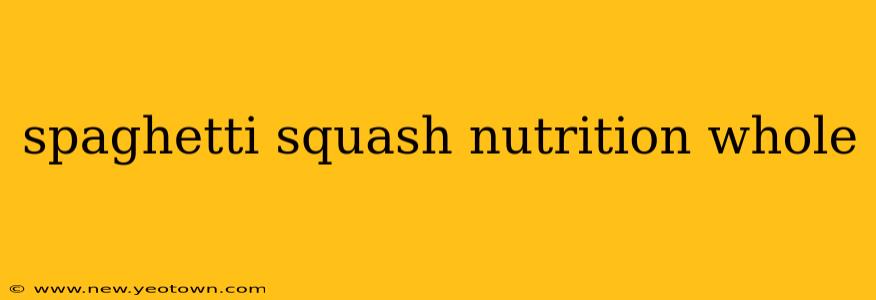Imagine a vegetable that tastes subtly sweet, cooks up fluffy and light, and resembles a bowl of noodles – that’s the magic of spaghetti squash! But beyond its fun texture and versatility, this winter squash packs a serious nutritional punch. Let's dive into the world of spaghetti squash nutrition, exploring its benefits and how it can enhance your healthy eating routine.
What are the nutritional benefits of spaghetti squash?
Spaghetti squash is a nutritional powerhouse, boasting an impressive profile of vitamins, minerals, and antioxidants. It's low in calories and fat, making it a perfect addition to weight-management diets. One cup of cooked spaghetti squash provides a good source of vitamin C, an antioxidant essential for immune function and collagen production. It’s also a decent source of vitamin A, crucial for vision and cell growth. Further, you’ll find traces of other essential vitamins like B vitamins (thiamine, riboflavin, and niacin) and minerals like potassium and manganese. The fiber content is noteworthy, contributing to healthy digestion and promoting satiety.
Is spaghetti squash good for weight loss?
Yes, spaghetti squash can be a valuable asset in a weight-loss journey. Its low calorie and high fiber content contribute significantly. The fiber creates a feeling of fullness, helping you stay satisfied between meals and preventing overeating. Replacing higher-calorie pasta dishes with spaghetti squash offers a considerable reduction in caloric intake without sacrificing the satisfying texture and culinary versatility you crave. Remember, however, that weight loss is a holistic endeavor and incorporating spaghetti squash as part of a balanced diet and exercise routine is key.
How many calories are in spaghetti squash?
One cup of cooked spaghetti squash contains approximately 42 calories. This low calorie count, combined with its substantial fiber content, makes it an excellent choice for those seeking to manage their weight. This low calorie density makes it easy to incorporate into calorie-controlled meals without compromising taste or satiety.
What are the health benefits of eating spaghetti squash?
Beyond weight management, spaghetti squash offers a range of health benefits:
- Improved Digestion: The high fiber content promotes regular bowel movements and prevents constipation.
- Enhanced Immunity: The presence of vitamin C strengthens the immune system, helping your body fight off infections.
- Better Vision: Vitamin A contributes to maintaining healthy vision and preventing age-related macular degeneration.
- Healthy Blood Sugar Levels: The fiber helps regulate blood sugar levels, making it beneficial for individuals with diabetes or those at risk.
- Lower Risk of Chronic Diseases: The rich antioxidant profile helps protect cells from damage caused by free radicals, potentially reducing the risk of chronic diseases.
How to prepare spaghetti squash for optimal nutrition retention?
To maximize the nutritional value of your spaghetti squash, opt for roasting or baking. These cooking methods help retain more nutrients compared to boiling or steaming. Avoid overcooking, as this can lead to nutrient loss.
Is spaghetti squash a good source of protein?
While not a primary source of protein, spaghetti squash does contain a small amount of protein. However, it’s essential to complement it with other protein sources in your diet to meet your daily protein requirements.
Is spaghetti squash keto-friendly?
Yes, spaghetti squash is a keto-friendly vegetable due to its low carbohydrate content compared to other starchy vegetables. It is a great low-carb alternative to traditional pasta. Remember to always factor its carbohydrate content into your daily macros when following a ketogenic diet.
This exploration of spaghetti squash nutrition showcases its versatility and nutritional value. From aiding weight management to supporting overall health, incorporating this squash into your diet can be a delicious and beneficial addition. Remember to consult with a healthcare professional or registered dietitian for personalized dietary advice.

